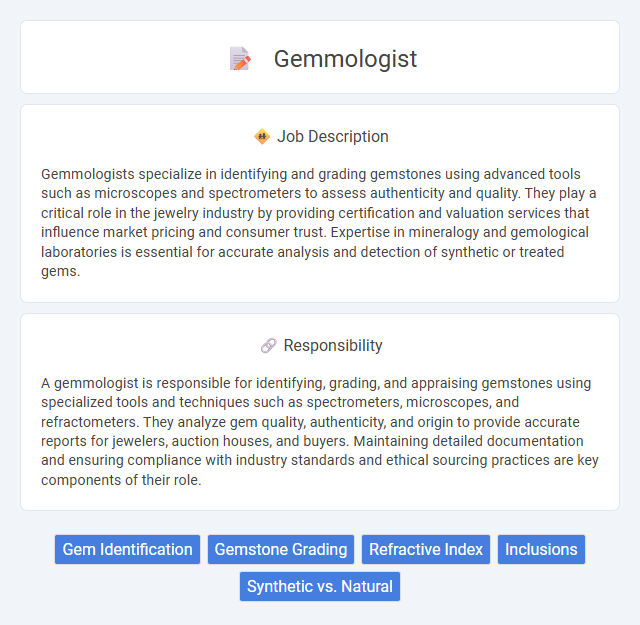
Gemmologists specialize in identifying and grading gemstones using advanced tools such as microscopes and spectrometers to assess authenticity and quality. They play a critical role in the jewelry industry by providing certification and valuation services that influence market pricing and consumer trust. Expertise in mineralogy and gemological laboratories is essential for accurate analysis and detection of synthetic or treated gems.
Individuals with a keen eye for detail and a strong interest in minerals and gemstones will likely be well-suited for a career as a gemmologist. Those who enjoy analytical work and have patience for meticulous examination may find this job fulfilling. People who prefer fast-paced environments or less precision-based tasks might struggle to thrive in this field.
Qualification
A gemmologist must possess a strong foundation in mineralogy, gem identification, and grading techniques, typically achieved through specialized certification programs such as those offered by the Gemological Institute of America (GIA) or the International Gemological Institute (IGI). Advanced knowledge of gem cutting, treatments, and synthetic stones is essential, along with hands-on experience using tools like microscopes, refractometers, and spectrometers. Candidates often hold degrees in geology, chemistry, or related fields, complementing their technical skills with training in gemstone market trends and appraisal standards.
Responsibility
A gemmologist is responsible for identifying, grading, and appraising gemstones using specialized tools and techniques such as spectrometers, microscopes, and refractometers. They analyze gem quality, authenticity, and origin to provide accurate reports for jewelers, auction houses, and buyers. Maintaining detailed documentation and ensuring compliance with industry standards and ethical sourcing practices are key components of their role.
Benefit
A career as a gemmologist offers the potential for high earning capacity due to the specialized skills in identifying and appraising gemstones. Job stability is likely since expertise in gemmology is crucial for jewelry retailers, auction houses, and certification labs. Opportunities for international travel and access to rare and valuable gems could also enhance personal and professional growth.
Challenge
The role of a gemmologist likely involves complex challenges in accurately identifying and grading gemstones, which requires a deep understanding of mineral properties and advanced analytical techniques. The probability of encountering synthetic or treated gems may increase the difficulty in ensuring authenticity and value assessments. Continuous learning and adaptation to emerging technologies are probably essential to overcoming these challenges effectively.
Career Advancement
Gemmologists specializing in gemstone identification and grading can advance their careers by obtaining certifications from recognized institutions like the Gemological Institute of America (GIA). Career progression often leads to roles such as quality control manager, jewelry appraiser, or even laboratory director, where expertise in gemology supports higher salary potential. Gaining experience with advanced analytical instruments and developing skills in client relations further enhance opportunities for leadership positions within the jewelry industry.
Key Terms
Gem Identification
Gemmologists specialize in identifying and analyzing gemstones using advanced techniques such as spectroscopy, refractometry, and microscopy to determine authenticity, quality, and value. Their expertise in distinguishing natural stones from synthetics or treated gems is crucial for jewelry appraisal and certification. Mastery of gem identification enhances market trust and supports the luxury gemstone industry.
Gemstone Grading
Gemmologists specializing in gemstone grading assess the quality and characteristics of precious stones by analyzing factors such as color, clarity, cut, and carat weight. They use advanced instruments like spectrometers and microscopes to identify treatments, enhancements, and authenticity of gemstones. Accurate grading by gemmologists is essential for valuing gemstones in jewelry, investment, and retail markets.
Refractive Index
Gemmologists analyze gemstones' refractive index to determine their authenticity, quality, and type by measuring how light bends as it passes through the stone. Precise refractive index data helps distinguish between natural, synthetic, and treated gems, providing critical information for valuation and classification. Mastery of refractive index measurement techniques is essential for accurate gemstone identification and enhancing credibility in gemological assessments.
Inclusions
Gemmologists specialize in analyzing and identifying inclusions within gemstones to determine their authenticity, origin, and quality. Inclusions, such as crystals, liquid, or gas bubbles trapped inside a gemstone, provide critical information about the gem's formation and can impact its value. Expertise in microscopic examination and use of advanced imaging techniques enables gemmologists to classify inclusions accurately and distinguish natural stones from synthetic or treated counterparts.
Synthetic vs. Natural
Gemmologists analyze and identify gemstones by distinguishing synthetic stones from natural ones using advanced techniques such as spectroscopy, microscopy, and refractive index measurement. The ability to detect treatments and synthetics is crucial for assessing a gemstone's authenticity, value, and origin. Expertise in synthetic gem materials like cubic zirconia, moissanite, and lab-grown diamonds ensures accurate certification and market transparency.
 kuljobs.com
kuljobs.com